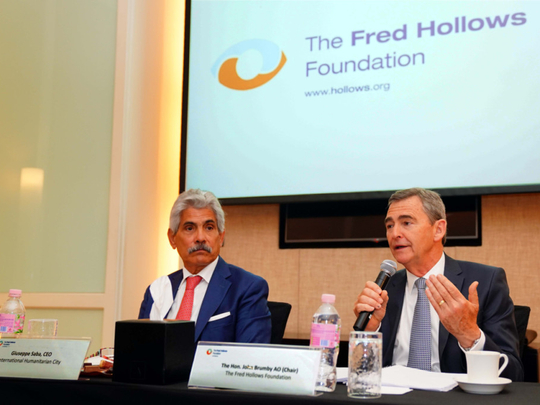
Dubai: An international developmental organisation that deals with avoidable blindness plans to partner with Noor Dubai and carry out preventive screening of over one million people and conduct 70,000 cataract surgeries by next year.
The Fred Hollows Foundation (FHF) will also train 11,000 doctors, nurses and health care workers in visual care in the region, John Brumby AO, chair of the foundation said on Monday. He also announced the opening of the regional office at the International Humanitarian City (IHC), Dubai.
Brumby said nearly 15 million people suffer from avoidable blindness, which means they can regain their eyesight with right care and surgery. The foundation which runs on charity donations has been focusing on the mission to eliminate avoidable blindness for the last 25 years,
The FHF was founded by late professor Fred Hollows and his wife Gabi. According to the WHO, nearly 79 million people in the world are blind due to refractive errors while 15 million who have lost their sight due to age related degeneration, or lack of proper sanitation and medication or due to lifestyle diseases, can be helped with timely intervention. The FHF focuses on the latter category of people.
Brumby elaborated: “Nearly four out of five people who are blind need not be and can regain their eyesight with surgical intervention.”
Expanding on some of the likely causes of avoidable blindness, he said: “Some of the major causes of blindness which can be completely cured with surgery are cataract, trachomas and diabetic retinopathy. While cataract occur because of age related degeneration, trachomas or eye infections occur because of lack of sanitation and medication and diabetic retinopathy occurs due to rising incidence of diabetes. All three can be completely prevented or treated.”
The organisation focuses on building sustainable solutions to prevention of blindness and with the cooperation of regional and local organisations plans to screen over one million people in the Middle East and South Asia, conduct 70,000 cataract surgeries and also train 11,000 doctors, nurses and community health workers and teachers so that the work can continue in a sustained manner with local expertise.
Brumby added that the organisation had its presence in 25 countries and was carrying out extensive work in Pakistan, Bangladesh, Afghanistan, Palestine, Nepal and planned to expand to other countries in the Middle East. He added: “We focus on women as nearly 50 per cent of those suffering from avoidable blindness are females. Our main purpose is to educate the women and train them in visual nursing care which we have done in Nepal and Bangladesh.”
Giueseppe Saba, the CEO of the IHC explained that the UAE was at the forefront of humanitarian work and one of the most generous donors to humanitarian causes. “We take up emergency work like building the aero bridge in Bangladesh to help the Rohingya crisis so that organisations like these can carry on their health care projects. We are real partners in this sense,” said Saba while welcoming his 50th international member at the IHC.
What is avoidable blindness
15 million who have their sight due to age related degeneration, or lack of proper sanitation and medication or due to lifestyle diseases, can be helped with timely intervention. The FHF focuses on this category of people.












